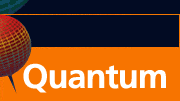CONTACTS
- Coordinator
Adolfo del Campo
-
Quantum Lunch Location:
T-Division Conference Room, TA-3,
Building 123, Room 121
 |


Quantum Institute: Visitor Schedule
The Quantum Lunch is regularly held on Thursdays in the Theoretical Division Conference Room, TA-3, Building 123, Room 121.
The organizing committee includes Malcolm Boshier (P-21), Adolfo del Campo (T-4 & CNLS), Michael Di Rosa (C-PCS), Armin Rahmanisisan (T-4 & CNLS), Changhyun Ryu (P-21) , Nikolai Sinitsyn (T-4), Rolando Somma (T-4), Christopher Ticknor (T-1), and Wojciech Zurek (T-4).
For more information, or to nominate a speaker, contact Adolfo del Campo.
To add your name to the Quantum Lunch email list, contact Ellie Vigil.
Thursday May 22, 2014
12:30 PM - 2:00 PM
Speaker: Tzu-Chieh Wei (Stony Brook)
Technical Host: Rolando Somma
TOPIC: Quantum computational universality of Affleck-Kennedy-Lieb-Tasaki states on two-dimensional lattices
Abstract
Universal quantum computation can be achieved by simply performing single-spin measurements on a highly entangled resource state, such as 2D cluster states. So far there is no complete characterization of universal resource states for measurement-based quantum computation. The family of Affleck-Kennedy-Lieb-Tasaki (AKLT) states has recently been explored in this context; for example, the spin-1 AKLT chain can be used to simulate single-qubit gate operations on a single qubit, and the spin-3/2 two-dimensional AKLT state on the honeycomb lattice can be used as a universal resource. However, it is unclear whether such universality is a coincidence for the specific state or a shared feature in all two-dimensional AKLT states. Here we consider the family of AKLT states on various two-dimensional lattices. We demonstrate that in addition to the honeycomb lattice, the spin-3/2 AKLT states on the square octagon $(4,8^2)$ and the `cross' $(4,6,12)$ lattices are also universal resources, whereas the AKLT state on the `star' $(3,12^2)$ lattice is likely not due to geometric frustration. Moreover, certain AKLT states with spin-2 and lower spin mixture are also universal.
|


